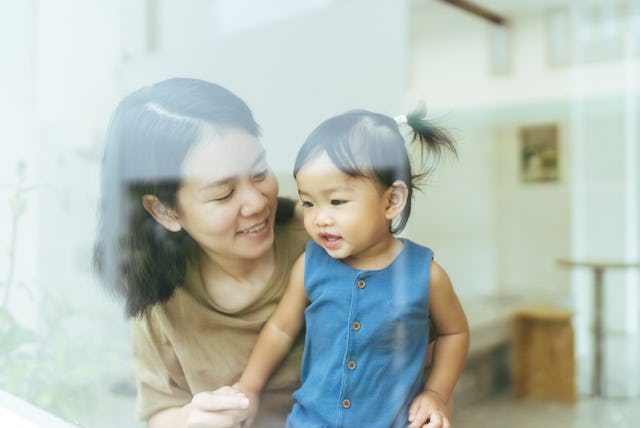Here's What The First Large Study Of Long COVID In Infants & Toddlers Found
There's good reason to get even your youngest kids vaccinated against COVID-19.

We know very little about long COVID — especially regarding how it can affect infants and toddlers. But now a new and large study out of Denmark has shed light on how the virus can impact the health of our youngest family members.
The quickest way to explain the findings? Yes, even infants and toddlers can suffer from long COVID. In fact, 40% of children under three suffered from certain symptoms two months after infection, more than any other kid age group. Only 27% of the control group reported similar symptoms.
But let’s back up a bit. The study, which was published in the medical journal The Lancet Child & Adolescent Health, followed 44,000 kids in Denmark up to the age of 14 — 11,000 of which had a confirmed case of COVID-19. All of the participants (or their parents) were then asked about a number of general symptoms whether or not the child had had COVID, including fatigue, moodiness, headaches, and stomach upset.
Generally, the kids who had tested positive for COVID were more likely to experience at least one of these symptoms for two months or more than kids who never got COVID.
The most common long COVID symptoms experienced by kids varied by age. For kids 3 and under, the most common symptoms were mood swings, rashes, and stomach aches. For kids 4 to 11, mood swings and stomach aches were joined by memory and concentration issues. For older kids up to 14, symptoms centered on memory and concentration problems, mood swings, and fatigue.
"Our findings align with previous studies of long Covid and adolescents showing that although the chances of children experiencing long Covid is low especially compared to group to the control group, it must be recognized and treated seriously," study co-author Selina Kikkenborg Berg, a professor of cardiology at Rigshospitalet in Demark, told CNN.
The study also revealed another unexpected piece of information that other studies have also found: the pandemic in general has caused a health crisis for older children and teens, whether or not they’ve been infected with the virus. Issues like anxiety, depression, stomach issues, and tiredness were rampant among all kids — and it’s likely due to school closures, isolation, and limited resources for kids.
In other words: It’s likely that lots of kids are being affected by the ripple effects of the pandemic, and a smaller number of kids are also being affected by long COVID after infection.
"There is a debate going on in both the medical world and in society, about whether all these kids are complaining about headaches and anxiety and stomachs, aches, and dizziness as to whether this is Covid or the stress of the pandemic. Yes, the pandemic did affect children in a negative way, but then you layer on Covid on top of that, and you see that there is something really going on here," Amy Edwards, a pediatric infectious disease specialist not related to the study who manages the long Covid clinic at UH Rainbow Babies and Children's Hospital in Cleveland, told CNN.
The findings of this study match earlier studies about long COVID and kids. For example, pooled data from 21 COVID studies around the world found that 25% of infected children and adolescents develop longterm complications affecting both mental and physical health.
There are, of course, weaknesses to the new study worth mentioning. It only looked at kids in Denmark and not in varied populations. In addition, it asked parents and kids about health issues that may or may not be caused by long COVID — at this point, it shows correlation only. As always, there’s more research to be done.
Still, it’s an in-depth and large study and one of the best of its kind to come out of the pandemic at this point. While the world waits for more information, kids of all ages can now get protection against the virus with a vaccination.
This article was originally published on